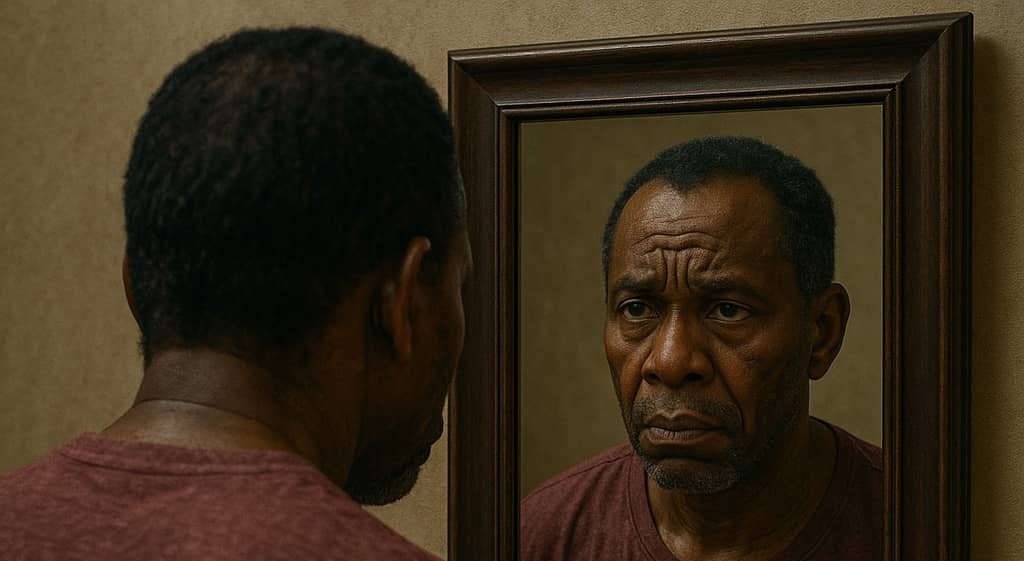By Isaac Christopher Lubogo
What do we tell the mirror when we no longer recognise our own reflection?
This is not a riddle. It is a philosophical scream. A silent rebellion against the betrayal of identity. For the mirror, once a trusted friend of certainty, has become a stranger—a cruel reminder that something, somewhere, has been lost. But what exactly? Is it the face? Or the soul behind it?
I. The Mirror as Metaphor: Beyond the Glass
The mirror is not merely a tool for grooming. It is a metaphor—of self-awareness, of truth, of confrontation. To lose recognition in it is to lose recognition in oneself. Carl Jung once noted, “The most terrifying thing is to accept oneself completely.” But what happens when you no longer know who that self is?
“Man in the Mirror, Stranger in the Soul”
There’s a moment in Michael Jackson’s haunting anthem “Man in the Mirror” where the voice breaks—not in pitch, but in truth.
“I’m starting with the man in the mirror, I’m asking him to change his ways…”
It’s not merely a lyric. It is a reckoning. A quiet revolution against the self, where the enemy is not out there in the world, but staring back from the silver-backed glass.
This is the same mirror we approach today—not for grooming, but for mourning. Mourning the lost self. The abandoned dreams. The quiet betrayals. The heavy compromises. What do we tell the mirror when we no longer recognise our own reflection? When the man in the mirror isn’t just broken, but unrecognisable?
Michael Jackson, in his paradox of fame and pain, offered more than a pop ballad—he offered a philosophical confession. He stood with the man in the mirror, not to accuse, but to awaken. And now we, too, must stand. Not with pride. Not with power. But with trembling truth.
For the mirror does not forgive. It reflects.
And the scariest part is not what we see, but what we no longer do.
So we begin here—with the shattered glass of selfhood,
and the hope… that maybe, just maybe, we can rebuild.
Not the face.
But the soul behind it.
In an age of performative living—curated identities on social media, moral outsourcing, spiritual emptiness masked by busyness—the dissonance between who we are and who we appear to be widens like a wound. The mirror does not lie. We do. And eventually, we lose track of the lie.
II. The Fractured Self: The Identity Crisis of Modern Life
Every day, we shed bits of ourselves to fit in, to be loved, to survive. We wear uniforms—of duty, of gender, of success. But beneath them all, the naked soul grows unfamiliar. This is the crisis of the modern man. Simone de Beauvoir wrote, “One is not born, but rather becomes, a woman.” So too, one is not born lost, but becomes so—through a thousand silent compromises.
> “We are what we pretend to be, so we must be careful about what we pretend to be.” — Kurt Vonnegut
In this performance of life, we get trapped in our own masks. What we once wore to impress becomes what we must wear to exist. One morning, we wake up, look into the mirror, and there stands not a friend—but an impostor.
III. The Mirror’s Question: Have You Betrayed Yourself?
What do we tell the mirror when we no longer recognise our own reflection?
Perhaps we say:
“Forgive me, I chose survival over truth.”
“I traded authenticity for approval.”
“I grew up and forgot who I was meant to be.”
And perhaps the mirror, in its cold silence, replies: “So did I.”
IV. Relatable Moments of Estrangement
This question is not theoretical—it visits us in countless moments:
The mother who sacrificed her dreams for her children, now staring blankly at herself, wondering who the woman in the apron is.
The executive whose soul was once filled with art, now clutching spreadsheets and chasing deadlines like a ghost in a suit.
The pastor who once heard God clearly, now preaching sermons he no longer feels.
The lover who stayed in a marriage for the children, for the image, for the mortgage—and wonders why the mirror looks so empty in the morning light.
These are not failures. They are echoes of humanity. But unacknowledged, they rot.
V. Redemption: Remembering Ourselves
There is hope. The mirror can still be a place of reintroduction. To pause and say: “I want to meet me again.”
As Søren Kierkegaard declared, “The most common form of despair is not being who you are.”
We must, then, rebel against forgetfulness. Reclaim lost art, re-embrace solitude, speak truths we swallowed, and weep the tears we buried. Every act of honesty restores a pixel of that lost reflection.
VI. Conclusion: Tell the Mirror the Truth
When we no longer recognise our own reflection, we must tell the mirror the truth we are afraid to admit:
“I abandoned myself. But I’m coming back.”
And as we return, slowly, painfully, the mirror will soften. The lines on the face will no longer accuse. The eyes will no longer seem haunted. The smile, though faint, will be real.
And when we finally recognise ourselves again, the mirror will not have changed—
We will.
> “He who looks outside dreams. He who looks inside awakens.” – Carl Jung
Let us awaken. For the stranger in the mirror is not an enemy.
He is the self—forgotten, waiting to be remembered.
# Suigeneris








